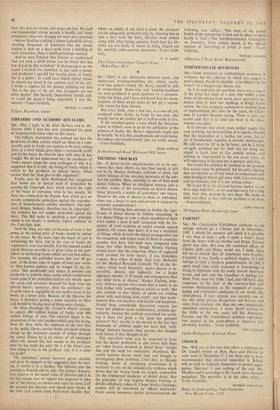LIBRARIES AND AUTHORS' ROYALTIES
SIR,—May I reply to Sir Alan Herbert and to Mr. Forstcr (who I note has now abandoned his guise of impartial television critic on this issue).
The Library Association has pointed out that the producers of other articles which arc hired on a com- parable scale to books are content to fix their selling price at a level which gives them a reasonable profit and let the buyer do what he likes with what he has bought. We do not understand why the producers of books cannot adopt the same technique or why it is suggested that it is only the hiring of books which is unfair to the producer or private buyer. What answer does Sir Alan give to this argument?
Firstly, says Sir Alan, Parliament has recognised that books are in special need of protection by passing the Copyright Acts, which restrict the right of the buyer to reproduce what he has bought. Sir Alan has overlooked the Patents Acts which give an exactly comparable protection against the reproduc- tion of manufactured articles, machinery and tech- nical designs. Industry therefore has its 'copyright': but industry has not sought protection against the hirer. This Bill seeks to establish a new principle which is not simply 'a perfectly logical addition' to the Copyright Acts.
Next Sir Alan says that an increase of even a few pence in the selling price of books would be unfair to the buyer. By the same logic the buyer of cars is subsidising the hirer, but in the case of books the argument is even less tenable. For the assured market which libraries provide is of great value to the pub- lishers in marketing books which arc not best-sellers. For example, the publisher knows that over 80 per cent. of the home sales of copies of most new works by little-known authors will be bought by the lib- raries. This predictable sale makes it possible and profitable to publish many works which would never reach print if the publishers had to rely wholly upon the small and uncertain demand for them from the private buyer: moreover, since the publisher's risk in such cases is negligible he can market most of his books at a lower price. Because of the libraries the buyer is therefore getting a wider selection of titles and should be buying most of them more cheaply.
Sir Alan abandons Mr. Forster's absurd attempt to equate 400 million hirings of books with 400 million hirings of cars. The relevant figure is the proportion of the total product which goes for hiring. Now Sir Alan shifts the emphasis to the fact that in the public library service books are hired without charge to the borrower (except of course through the rates). Unless he is an enemy of all municipal effort why should this fact matter to the producer once he has made his sale? Or is it Sir Alan's case that hiring is fair to the producer only if it is done for profit?
The publishers' annual turnover grows steadily and gives no support to the suggestion that the buy- ing of books is in a decline. The libraries and the publishers flourish side by side. The Library Associa- tion believes in the social value of libraries and it is
for this reason that we oppose this proposal to take out of the service an annual sum equal to about half the amount the libraries now spend upon books. If the time ever comes when Parliament decides that,
where an article of any kind is hired, the producer can be adequately protected only by allowing him to take a levy from the hirer, libraries must submit along with other hiring agencies. Until then the lib- raries are not likely to assent to being singled out for specially unfavourable treatment.—Yours faith- fully,
H. D. BARRY
The Library Association, Chaucer House, Motet Place, WC1


































 Previous page
Previous page